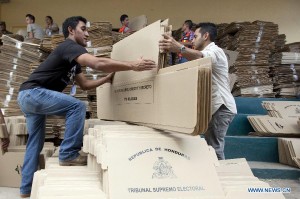
Honduras: Elections in the semistates
By Guillermo Almeyra
Honduras, like Mexico, is a semistate of the Union.
Everything in the Honduran government is decided with the blessing of the United States Embassy and Honduras’ economy relies on the remittances sent by its émigrés, that is, on the exportation of able bodies and their blood.

Honduras was first utilized by Washington as a base against the Cuban revolution, later against the Sandinista revolution and government. Today, the U.S., from its base in Palmerola and two other military bases in Honduras, threatens Cuba and Venezuela, dominates Central America and prepares to intervene in Colombia, where the process of peace with the FARC and the rift between Uribe and Santos weaken the Pacific Alliance, which is further weakened by the defeat of the right in Chile.
The state apparatus is in the hands of 15 families, whose Executive Power ceded to transnational companies entire areas of territory where the nation’s laws are not observed. That’s what Calderón did in Mexico with the U.S. espionage stations that made repression their priority – and not only against drug trafficking.
The Honduran elections of Nov. 24 – like those in Mexico in 1988, 2006 and 2012 – were a farce. The owners of power imposed Juan Orlando Hernández to perpetuate and perfect the antipopular measures begun by the oligarchic-Yankee coup d’état against Manuel Zelaya, and enforced by the government of Porfirio Lobo, who continued the dictatorship.
The mobilizations against the dictatorship first, and in support of the candidacy of Xiomara Castro and her Free Party later, were permanent and massive. The Honduran workers and people bravely resisted the coup and the oligarchy and transformed their National Front of the People’s Resistance, supported by movements like the Peasants Way, into the electoral formula of the Free Party.
In their actions, mobilizations and the election campaign, they tried to change the relation of forces. That way, they won the support of large sectors of the urban middle classes, beginning with the students, who today struggle against the electoral fraud.
The Honduran people, with great maturity and trying to prevent state violence, performed their civic duty. Their action caused a fracture in the bloc of major oligarchs, because some of them fear what might happen in Hernández’s illegitimate government tries to proceed with the policies that the Yankee embassy dictates to its servants and junior partners and resorts to the forces of repression.
The mobilizations against the fraud will continue. They will be larger and will include the sectors of the urban and rural middle classes that voted for the Party Against Corruption (PAC) and even sectors of the Liberal Party supporters.
The fraud was evident and brazen, even though Daniel Ortega recognizes and salutes its beneficiary and the ALBA keeps silent. The departing president, Porfirio Lobo, in effect shifted the weight of the state apparatus in favor of his National Party and the NP candidate, Hernández.
The press, in the hands of the oligarchy, disinformed every day and ignored the campaign and positions of Xiomara Castro. In addition, it silenced the terrible social effects of the neoliberal policy and the control of Honduras by the U.S. Embassy, which at all times intervened in the election campaign.
The Free Party and the Party Against Corruption challenged the fraudulent results and called for a legal mobilization to back their complaint. Xiomara Castro and Manuel Zelaya are mollified by the fact that the government has no majority in Parliament and are trying to keep the university sit-ins from deteriorating into land grabs or popular uprisings. Meanwhile, the Free Party supporters have issued a call for struggle, feeling that only strong action can force the National Party administration to give in.
In a semistate that functions like a barely disguised colony of the United States, legality is a fiction and the Parliament barely serves as a secondary tribune for the protests and demands of the people, since it merely confirms the decisions made in Washington and in a few desks.
It is one thing to utilize all the spaces and opportunities, electoral or juridical, of that pseudo-legality; it is quite another to believe that papers, legal action and statements can modify the relationship of forces as if we were in Sweden.
It is correct to use the electoral dispute to extend the reach of propaganda and create organizational bases throughout the country. It is necessary to avoid, if possible, a bloody and unequal struggle against the repressive forces and to gain allies, forces and positions by relying on the legitimacy of our own triumph and our own behavior.
It is imperative that the usurpers appear as such before everyone, to demonstrate that there is no other way but to topple them.
But the diffusion of illusions over the effectiveness of protests within the frameworks fixed by the usurpers and over the possibility of using against them institutions that lack any real power disarm and divide the resistance of the masses.
The cretinism of the courts and a Parliament that are respectful of a regime that’s only a dictatorship of capital sustains the regime more than the strength of an army. Because a revolutionary struggle divides and demoralizes the soldiers and policemen, while the claudication of those who appear as leaders of the people’s struggle weakens the workers, who are the only ones who can expel the imperialism and oligarchy from power.
There are situations where only civilian resistance and popular uprising can guarantee justice, legality and national independence.
(From the Mexican newspaper La Jornada)


